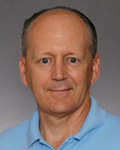Dr. Raymond Higbea has been involved in public health education and action for
years; he has taught all of the health care administration courses at WMU for the past
five years, and before that taught at Cornerstone University for two years. Dr. Higbea’s
doctoral research addressed access to health care by the uninsured, and he has
been involved in this issue for over 10 years. Dr. Higbea joined the Enroll Kalamazoo
Community Outreach initiative (as well as a coalition based in Calhoun County) and
became involved in organizing official enrollment events in both counties.
Of the planning and execution of the Kalamazoo enrollment events themselves,
Dr. Higbea said they appeared to be on the whole successful. “The biggest issues were
the computer issues,†he said. Dr. Highbea estimated that at least 1,000 people were
brought into the enrollment events and successfully signed up for health insurance.
And while a possible 11,000 more uninsured residents remain eligible in Kalamazoo for
insurance under the ACA, Dr. Higbea believes that managing to recruit that number of
people at these events was a big achievement, as, in his opinion, “Enroll America and
Enroll Michigan did little†in actually bringing people to register. The success came from
the local level, according to Dr. Higbea.
Juxtaposing the apparent success of the enrollment events, however, was Dr.
Higbea’s attitude concerning the actual effects the ACA is going to have on increasing
access to health care. In his opinion, no real net increase in access to care will actually
be achieved through the ACA, as “the uninsured aren’t always the poor; it’s a lot of
small-business owners and professionals.†In Dr. Higbea’s view, the majority of those
who are actually gaining health care through the ACA are people who had been
enrolled in a health insurance plan before, but had decided to give it up due to high
premiums. Therefore, the people who are “newly insured†under the ACA are those
who still could afford health care before, but simply had co-pays and premiums that
were too high to make it worth paying for health insurance each month. He cited the
immense success of the Portage, Michigan enrollment event as an example of this
phenomenon, as the majority of those attending were part of the middle class — in other
words, people whose main cause for celebration was not the possibility of accessing
health care, but at doing so at a lower price than before. For a great proportion of those
who make too much to qualify for Medicaid but are still struggling economically, Dr.
Higbea feels the ACA is not truly helping them to gain access to health care, as cost
“barriers [like]… the copays and deductibles†will most likely cause them to decline
enrollment or drop out of their new insurance plans.
While Dr. Higbea was skeptical as to the extent the ACA has had thus far on
increasing access to health care, he did seem to believe that the country is on a positive
trajectory concerning health and health care thanks to the new law. While public
opinion concerning the ACA is still fairly negative, he feels that “the sentiment is turning
from ‘repeal and replace’ to ‘repair.’†However bumpy the implementation of the ACA
has been, Dr. Higbea believes that this more universal approach at increasing access to
health services cannot simply be dissipated by policy makers in the future. As he
concluded, “the framework [for a better health system] is there.â€
